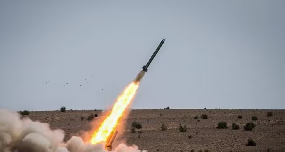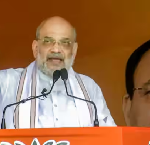The Lebanese militant group Hezbollah announced that it fired a barrage of missiles at a military base deep inside Israel early Sunday following an Israeli airstrike more than a day earlier that killed at least 37 people, including one of the militant group’s senior leaders as well as women and children. It was not immediately clear if any of the rockets had hit their target. Israel’s emergency medical services reported that a man was lightly wounded by shrapnel from a missile that was intercepted in a village in the lower Galilee.
Local media reported that rockets shot from Lebanon were intercepted in the areas of Haifa and Nazareth. The Israeli military said only that it had monitored the launch of “about ten rockets” from Lebanon, of which most were intercepted.
Hezbollah said it had launched “dozens of Fadi 1 and Fadi 2 missiles” – a new type of weapon the group had not used before – at the Ramat David airbase, southeast of Haifa, “in response to the repeated Israeli attacks that targeted various Lebanese regions and led to the fall of many civilian martyrs.”
In July, the group had released a video with what it said was footage it had filmed of the base with surveillance drones. Israel and Hezbollah had exchanged heavy fire on Saturday as rescue crews in Beirut searched the rubble of an apartment building that was leveled by the Israeli strike the day before.
Hezbollah has vowed to retaliate against Israel for a wave of apparently remotely detonated explosions that hit pagers and walkie-talkies belonging to Hezbollah members Tuesday and Wednesday, killing at least 37 people – including two children – and wounding around 3,000. The attacks were widely blamed on Israel, which has not confirmed or denied responsibility.
On Friday, an Israeli airstrike took down an eight-story building in a densely populated neighborhood in Beirut’s southern suburbs as Hezbollah members were meeting in the basement, according to Israel. Among those killed was Ibrahim Akil, a top Hezbollah official who commanded the group’s special forces unit the Radwan Force. Also killed was Ahmed Wahbi, a top commander in the group’s military wing, the Israeli military said.
Lebanon’s health minister, Firass Abiad, told reporters Saturday that at least seven women and three children were killed in Friday’s airstrike on the building. He said another 68 people were injured, including 15 who were hospitalized.
It was the deadliest strike on Beirut since the bruising monthlong war in 2006 between Israel and Hezbollah, and the casualty count could grow, with 23 people still missing, a government official said.
Israel’s defense minister, Yoav Gallant, said the attack thwarted the group’s chain of command while taking out Akil, who he said was responsible for Israeli deaths and who was on the U.S. wanted list for years.
“This is our commitment to the fallen and their loved ones. This is our commitment to the residents of the north. And this is a clear message to all those who seek to harm us,” he posted on X.
The Israeli government braced for an expected surge in Hezbollah rocket attacks by setting new caps on the size of gatherings and other restrictions in the north of the country, near Israel’s border with Lebanon.
Hezbollah confirms more than a dozen operatives were killed
Akil, the main target, had been wanted by the U.S. for years for his alleged role in the 1983 bombing of the U.S. Embassy in Beirut and the taking of American and German hostages in Lebanon in the 1980s. The U.S. State Department last year announced a reward of up to $7 million for information leading to his “identification, location, arrest, and/or conviction.”
White House national security adviser Jake Sullivan called Akil’s death “a good outcome” and said he had “American blood on his hands” for the embassy attack.
“You know, 1983 seems like a long time ago,” Sullivan said. “But for a lot of families and a lot of people, they’re still living with it every day.”
Wahbi was described as a commander who played major roles within Hezbollah for decades and was imprisoned in an Israeli jail in southern Lebanon in 1984. Hezbollah said he was one of the “field commanders” during a 1997 ambush in southern Lebanon that left 12 Israeli troops dead.
Hezbollah announced overnight that 15 of its operatives had been killed by Israeli forces, but it didn’t how or where they died. Meanwhile, the Israeli army spokesperson, Lt. Col. Nadav Shoshani, said Saturday 16 Hezbollah fighters were killed in Friday’s strike.
Israel airstrikes and Hezbollah rocket attacks continue
Israel and Hezbollah engaged in heavy back-and-forth strikes on Saturday. The Israeli military confirmed that about 90 rockets had been fired at northern Israel and that Israel had struck more than 400 rocket launchers in Lebanon during the day.
Expecting a surge in rocket attacks, Rear Adm. Daniel Hagari, an Israeli defense spokesman, announced updated safety guidelines for areas north of Haifa, including caps on gatherings of 30 people in open spaces and 300 in enclosed spaces. Work and school can continue if people can reach protected areas in a timely manner. But since students and teachers in some places wouldn’t be able reach shelters in the required time, Sunday classes were canceled in at least two border regions within an hour of the announcement.
Earlier this week, Israel’s security cabinet said stopping Hezbollah’s attacks on the country’s north, which would allow displaced residents to return to their homes, is now an official war goal, as Israel considers a wider military operation in Lebanon that could spark an all-out conflict. Israel has since sent a powerful fighting force to its northern border.
Hezbollah has maintained that it will halt its strikes only when a cease-fire is reached between Israel and Hamas in Gaza,
Israel and Hezbollah have traded fire regularly since Hamas’ Oct. 7 assault on southern Israel ignited the Israeli military’s devastating offensive in Gaza. But previous cross-border attacks have largely struck areas in northern Israel that had been evacuated and less-populated parts of southern Lebanon.
Hezbollah bombardments preceded the Israeli strike
Friday’s strike came hours after Hezbollah launched one of its most intense bombardments of northern Israel in nearly a year of fighting, largely targeting Israeli military sites. Israel’s Iron Dome missile defense system intercepted most of the Katyusha rockets.
The militant group said its latest wave of rocket salvos was a response to Israeli strikes on southern Lebanon. However, it came days after mass explosions of Hezbollah pagers and walkie-talkies killed at least 37 people, including two children, and wounded roughly 3,000 others.
Abiad, the Lebanese health minister, said Saturday that hospitals across the country were filled with the wounded.
The pager and walkie-talkie attacks have been widely attributed to Israel, which hasn’t confirmed or denied involvement. They marked a major escalation in the past 11 months of simmering conflict along the Israel-Lebanon border.



